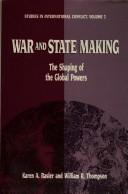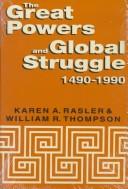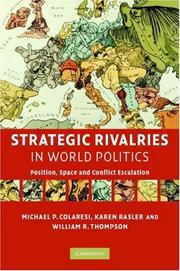| Listing 1 - 3 of 3 |
Sort by
|

ISBN: 0044450974 Year: 1989 Publisher: Boston Unwin Hyman
Abstract | Keywords | Export | Availability | Bookmark
 Loading...
Loading...Choose an application
- Reference Manager
- EndNote
- RefWorks (Direct export to RefWorks)
Geopolitics. --- State, The. --- War --- Economic aspects.

ISBN: 0813118891 Year: 1994 Publisher: Lexington, Ky. University Press of Kentucky
Abstract | Keywords | Export | Availability | Bookmark
 Loading...
Loading...Choose an application
- Reference Manager
- EndNote
- RefWorks (Direct export to RefWorks)

ISBN: 9780521881340 052188134X 9780521707619 0521707617 9780511491283 9780511379154 0511379153 051149128X 1107184967 9781107184961 1281243701 9781281243706 9786611243708 6611243704 0511378289 9780511378287 0511377401 9780511377402 0511376464 9780511376467 0511374933 9780511374937 Year: 2007 Publisher: Cambridge : Cambridge University Press,
Abstract | Keywords | Export | Availability | Bookmark
 Loading...
Loading...Choose an application
- Reference Manager
- EndNote
- RefWorks (Direct export to RefWorks)
International conflict is neither random nor inexplicable. It is highly structured by antagonisms between a relatively small set of states that regard each other as rivals. Examining the 173 strategic rivalries in operation throughout the nineteenth and twentieth centuries, this book identifies the differences rivalries make in the probability of conflict escalation and analyzes how they interact with serial crises, arms races, alliances and capability advantages. The authors distinguish between rivalries concerning territorial disagreement (space) and rivalries concerning status and influence (position) and show how each leads to markedly different patterns of conflict escalation. They argue that rivals are more likely to engage in international conflict with their antagonists than non-rival pairs of states and conclude with an assessment of whether we can expect democratic peace, economic development and economic interdependence to constrain rivalry-induced conflict.
International relations. --- Strategic rivalries (World politics). --- War. --- Strategic rivalries (World politics) --- International rivalries (World politics) --- International relations --- World politics --- Armed conflict (War) --- Conflict, Armed (War) --- Fighting --- Hostilities --- Wars --- Military art and science --- Coexistence --- Foreign affairs --- Foreign policy --- Foreign relations --- Global governance --- Interdependence of nations --- International affairs --- Peaceful coexistence --- World order --- National security --- Sovereignty --- Social Sciences --- Political Science
| Listing 1 - 3 of 3 |
Sort by
|

 Search
Search Feedback
Feedback About UniCat
About UniCat  Help
Help News
News